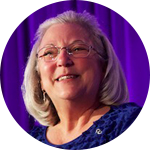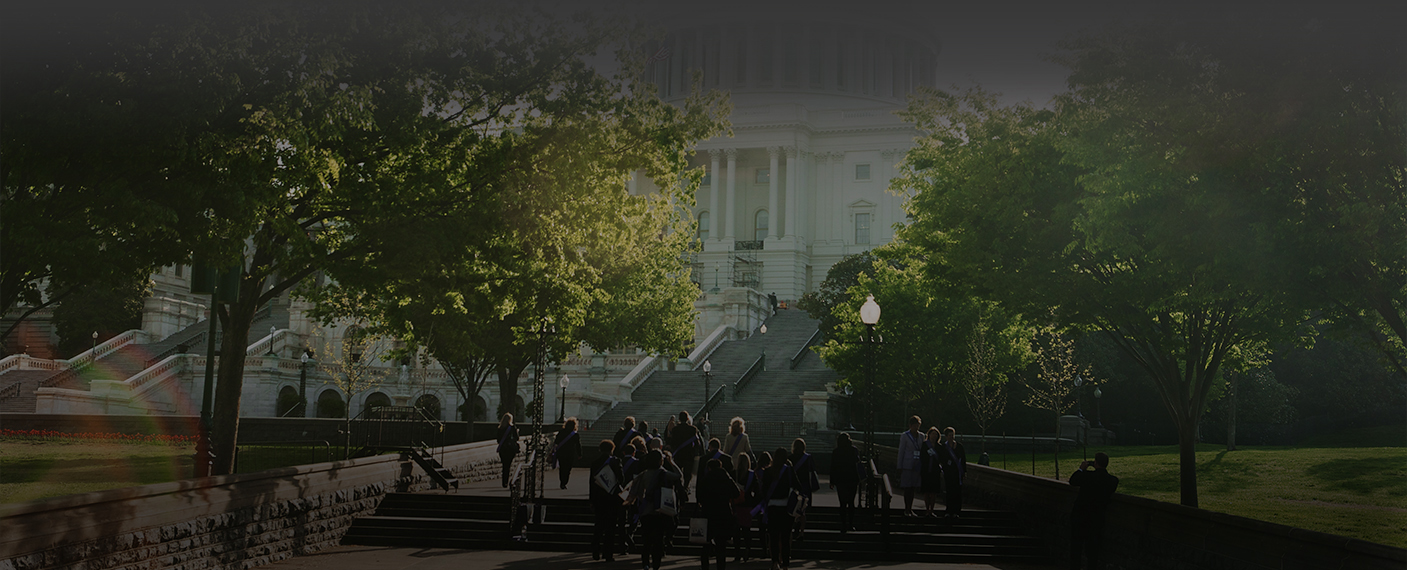Terry Berry
Terry Berry was diagnosed with younger-onset dementia, probable frontotemporal dementia (FTD), in 2011 at the age of 56. Prior to her diagnosis, she was a marketing and enrollment coordinator for Riverside Health System. She served as an Alzheimer's Association National Early-Stage Advisor in 2013.
Is it even possible to put into words what it felt like to hear your diagnosis?
Once those words come from a doctor, you can't shove them back in, so you kind of put off hearing it. It's pretty devastating. I was told to get my affairs in order; the doctor didn't give me much more than that. I went for other opinions and kept hearing the same thing, so I said, "OK, time to move on."
How did you begin to experience symptoms and realize that maybe something was up?
I started to feel a little less attached emotionally than I normally felt. At work, I started really struggling. I never used sticky notes. I always had a great memory, but I started having to write everything down. Before I knew it, my desk was just a sea of yellow Post-It notes. I had a lot of difficulties at home. My house used to be in order and my bills were always paid. Suddenly, I received a turn-off notice for my electricity and couldn't figure out how it happened. Things just kind of started unraveling, and the more I tried to do, the more of an issue it became.
I became a lot more impatient with things. I was never that way before. I couldn't keep up with my finances, my bills, my house. I started staying downstairs and sleeping in the living room because I'd come home from work so exhausted from trying to make it through the day. I would drop the mail on the floor, feed the dog, let him out and hit the couch.
How are you doing now?
I'm doing well. As long as I don't try to do too much at one time, I do pretty well. I try to stay busy and keep my mind occupied. I go to the senior center and do activities there, and I take an exercise class. I have to be very careful not to overload myself, because I then notice my symptoms a lot more.
How did you end up becoming an Alzheimer's advocate?
I was living in Richmond, Virginia, and when I had to move up to Northern Virginia with my daughter — because the doctor said I shouldn't live alone anymore — I felt very isolated. I wanted to talk to someone that I could share my experience with, so we could support each other, but there really wasn't anything in our area. So I started communicating with the Alzheimer's Association, and we created a great support group for early-onset and early-stage Alzheimer's and other dementias in our area. That really was the starting point, trying to get support for myself and knowing that there are others out there probably feeling isolated and alone.
What was your experience like serving as an Early-Stage Advisor?
It was wonderful. It was very fulfilling. I know that I was able to reach out and touch a lot of people's lives and help them.
Was there any moment or interaction during your time as an Advisor that stands out?
Oh, boy, there were a lot. The 2014 Advocacy Forum was fun because we were all together. For myself and many of the people in our group, we really treasured that time. We had a few days where would could joke and laugh and talk and be together. It was great giving the speech at the National Alzheimer's Dinner. I was very impressed with the teleprompter — it was very helpful for someone with a memory issue.
You spoke very eloquently and powerfully at the dinner. Were you nervous?
No. I try to find the blessings in things. This disease comes with a few blessings. I don't seem to get nervous about doing anything. Normally, I would've been scared to death. I also don't feel the level of excitement that I know I used to feel, so it's kind of bittersweet. But it was fun to be able to reach out and tell my story and hopefully release that stigma that somebody diagnosed with Alzheimer's or dementia doesn't go directly to the end stage. There's a beginning and a middle. When you're diagnosed, it's only the beginning. Don't give up.
How many times have you attended the Forum?
The 2014 Forum was my second.
How would you describe what it's like?
It's a wonderful experience to see how many people are involved and are working to advocate. It's great to see so much support, and it also prepares you to talk to Congress. All around, it's just a wonderful experience.
What were your Hill visits like? How do you feel like advocates were received?
I thought we were well-received. In 2013, we spoke to Rep. Frank Wolf (R-Va.) for about 45 minutes. He ended up cosponsoring the HOPE Act within a week or two after our visit. It was really nice to see that our visit actually did something.
What would you say to someone who might be considering attending the Forum but maybe isn't sure?
It's just something you wouldn't want to miss. If you have the disease and are worried about it being too overwhelming, the Alzheimer's Association provides a nice setup so you can get away and kind of reset a little. They make sure you're taken care of. It's an experience where you need to get there and let your voice be heard.
During your National Dinner speech, you asked attendees, "What can I do in the fight against Alzheimer's. What can I contribute?" What do you think advocates can do to compel lawmakers to battle this disease?
We need to continue to share our stories and appeal to lawmakers about the importance of them recognizing Alzheimer's and dementia as a national concern. I know Congress is worried about the spending, but if they don't spend the money now, they're going to spend a lot more later.
Are you confident things will progress in the right direction?
I feel like in the last year there's been a momentum starting. It's a slow departure from the train station, but eventually we'll get down the track.
Back to top
Back to Advocacy Stories


Join the conversation #ENDALZ #alzforum